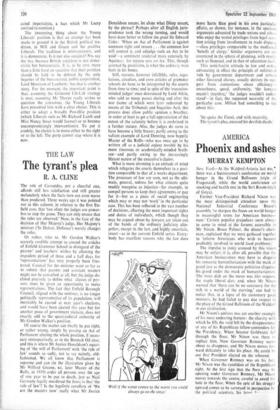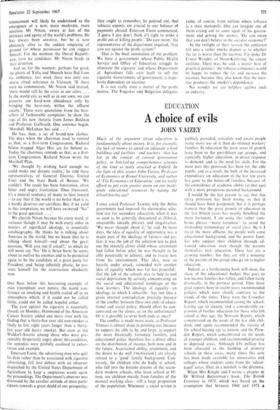Phoenix and ashes
AMERICA MURRAY KEMPTON
New York—At the Waldorf-Astoria last wet • there was a businessmen's conference on world hunger in the Grand Ballroom (style of Fragonard), while the world conference on smoking and health met in the Sert Room (style of Goya).
Former Vice-President Richard Nixon was the most distinguished attendant upon the National Industrial Conference Board's assembly `to sharpen the focus on world hunger in meaningful terms for American business- men.' Certain populist prejudices seem always to come to mind at the forums accessible to Mr Nixon. Bruce Palmer, the dinner's chair- man, explained that we were gathered together to 'inform Americans who wish to become profitably involved in world food problems.'
The impulse to irony aroused by this vision may be unfair; it is, after all, possible that the American businessman may have to disguise his romantic humanitarianism with the mask of greed just as the democratic politician disguises his greed under the mask of humanitarianism. The main dish on the menu was filet mignon, the staple liberal diet; and, when Mr Nixon warned that 'there can be no sanctuary for.the rich in a world of the starving,' one had to notice that, in a lapse of his customary good manners, he had failed to pay due respect to the place of the Grand Ballroom of the Waldorf in our civilisation.
Mr Nixon's address was yet another example of his most endearing feature: the alacrity with which he fills the void left by the disappearance of any of his Republican fellow-contenders for the Presidency. When Senator Goldwater fell through the floor, Mr Nixon was there to replace him. Now Governor Romney seerni about to disappear, and Mr Nixon moves for- ward delicately to take his place. He.could b. our first President elected on the rebound.
When Governor Romney was on his feet, Mr Nixon was the candidate of the Republican right. At the first sign that the floor may be opening under Governor Romney, Mr Nrixon moves towards the centre, careful to avoid the hole in the floor. When the epic of his struggle upward comes to be surveyed in perspective by the political scientists, his latect f..
nouncement will likely be understood as the emergence of a new, more moderate, more sensitive Mr Nixon, aware at last of the intricacy and agony of the world's problems. He has always been sensitive, but he is now obviously alive to the sudden emptying of ground for whose possession he can suggest himself. For the moment the liberal Republi- cans have no candidate; Mr Nixon heads in their direction.
And so, for the moment, perhaps for good, the ghosts of Yalta and Munich have fled from his ambience; last week there was only one sparse ritual reference to Vietnam. 'If there were no communism,' Mr Nixon said instead, `there would still be the crisis in our cities.... In the world city as well as in our own, we can preserve our hard-won abundance only by bringing the have-nots within the affluent society.' There were quotations from the best- sellers of fashionable complaint; he drew the rags of his new rhetoric from James Baldwin and Professor Galbraith. One sentence began, `Marshall McLuhan has said . .
He has, then, a set of brand-new clothes. The days when the chairman used to remind us that, as a first-term Congressman, Richard Nixon trapped Alger Hiss are far behind us. Today the chairman reminds us that, as a first- term Congressman, Richard Nixon wrote the Marshall Plan.
'We thought by wishing hard enough we could make our dreams reality,' he told these representatives of General Electric, United Fruit and the State Bank of Boston. 'We couldn't. The result has been frustration, often bitter and angry frustration. Thus frustrated, it's a natural tendency of many to turn inward —to say that if the world is no better than it is, it hardly deserves our sacrifices. But, if we yield to this temptation, we will have answered "No" to the great question . .
We cherish Nixon because his every word, at variance though it may be with every other in matters of superficial ideology, is essentially autobiography. He thinks he is talking about America in the world; but we know that he is talking about himself—and about the great question, Will you run if asked?,' to which he wilt never say 'No.' He is thrice born; he seems about to outlive his enemies and to be permitted again to be the candidate of a great party for President, and, being infinitely plastic, he pre- sents himself for the resurrection absolutely new.
One floor below this heartening example of man triumphant over nature, the world con- ference on smoking and health trailed off in an atmosphere which, if it could not be called futile, could not be called hopeful either.
The case against the cigarette is essentially closed; on Monday, Hammond of the American Cancer Society added one more rivet with the finding that a thirty-five year old non-smoker is likely to live eight years longer than a thirty- five year old heavy smoker. But even at the Waldorf-Astoria among those who were pre- sumably desperately angry about this condition, the remedies were pitifully confined to exhor- tation and example.
Emerson Foote, the advertising man who quit his firm rather than be associated with cigarette advertising, fell into debate with an observer dispatched by the United States Department of Agriculture to keep a suspicious watch upon the proceedings. The Department's observer was distressed by the cavalier attitude of most parti- cipants towards a great shield of our prosperity; they ought to remember, he pointed out, that tobacco exports arc crucial to our balance of payments abroad. Emerson Foote commented, 'I guess I just don't think it's right to make a profit out of killing people.' Do you mean,' the representative of the department inquired, 'that you are against the profit system?'
That is the final summation of the problem. We have a government whose Public Health Service and Office of Education struggle to eliminate the cigarette and whose Department of Agriculture falls over itself to sell the cigarette. Government, all government, is hope- lessly dependent on nicotine.
It is not really even a matter of the profit motive. The Yugoslav and Bulgarian delegates came,- of course, from nations where tobacco is a state monopoly. One can imagine one of them crying out to some agent of his govern- ment and getting the answer, `Do you mean that you don't believe in the socialist economy?'
In the twilight of their session the conferees fell into a rather murky dispute as to whether the tar is worse than the nicotine. Up spoke Dr Ernest Wynder, of Sloan-Kettering. the cancer institute. There was, he said, a matter here of practical politics: the tobacco companies would be happy to reduce the tar and increase the nicotine, because they also know that the nico- tine produces the smoker's dependency.
No wonder we are helpless against such an industry.



































 Previous page
Previous page